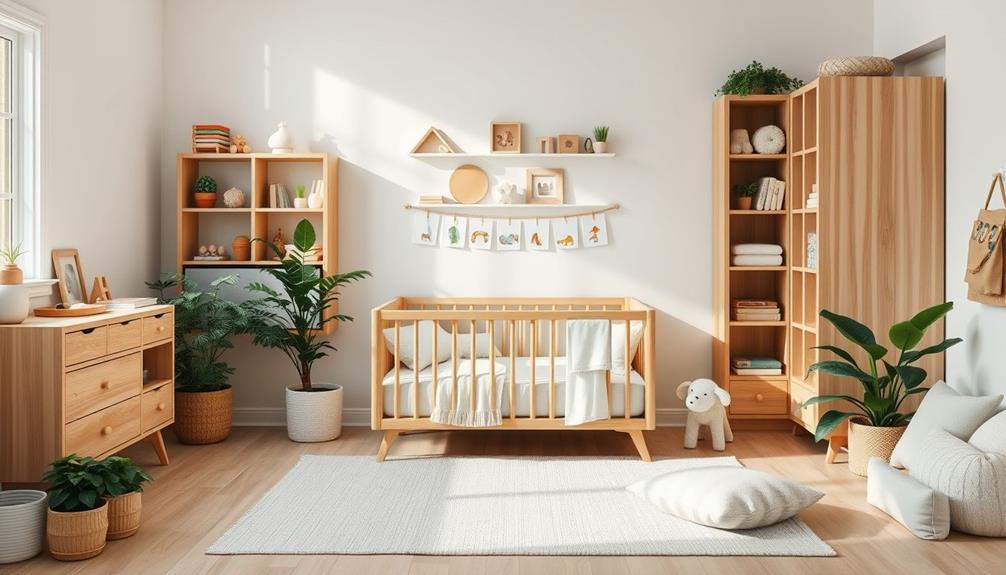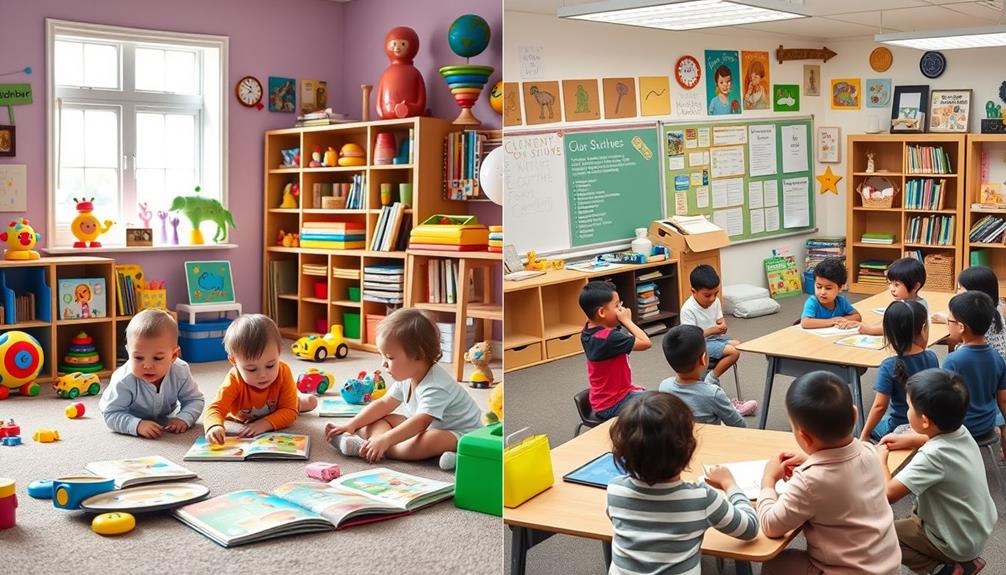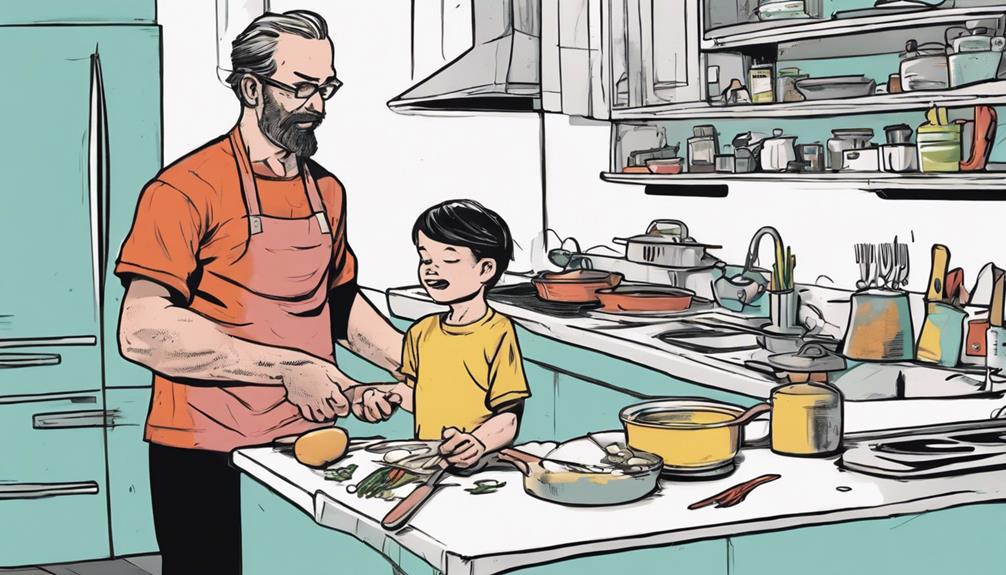Setting up a Montessori-inspired nursery for your advanced baby is all about fostering independence and exploration. Start with child-sized furniture, like low tables and shelves, so your baby can easily access toys. Use natural materials for a calming atmosphere, and maintain a clutter-free environment to encourage movement and focus. Safety is key, so baby-proof the space with rounded-edge furniture and secure heavy items. Rotate toys regularly to keep their interest piqued. By creating this nurturing environment, you empower your child to learn at their own pace. Curious to discover more tips for enhancing your nursery?
Key Takeaways
- Create a child-led learning environment with accessible low shelving and child-sized furniture to promote independence and exploration.
- Use natural materials like wood and cotton to enhance sensory experiences and create a calming atmosphere.
- Implement safety measures by baby-proofing the nursery, securing furniture, and maintaining a clutter-free space.
- Incorporate developmental play equipment and sensory exploration activities to support cognitive and physical growth.
- Establish soothing sleep routines and provide a comfortable sleeping area to promote healthy sleep habits.
Understanding Montessori Principles
The Montessori approach is all about child-led learning, allowing your little one to explore their environment and develop independence from an early age. Central to the Montessori Method is the idea of a prepared environment that encourages freedom to move.
You'll want to create a space where your baby can safely navigate and discover on their own, promoting confidence and self-reliance. Incorporating elements that stimulate cognitive growth and problem-solving skills can further enhance this environment, as play is essential for development. Engaging in interactive learning through play helps children explore their surroundings in meaningful ways.
In a Montessori nursery, safety is key. Low furniture and baby-proofing give your child the freedom to move without restrictions. By using natural materials and calming aesthetics, you foster a nurturing atmosphere that ignites curiosity and a love for learning.
Additionally, consider incorporating mixed-age groups if you have older children. This can enhance social learning and collaboration, allowing your little one to observe and interact with peers of varying developmental stages.
Movement and sensory experiences are essential, so instead of confining your baby to cribs or playpens, provide opportunities for voluntary exploration.
In essence, understanding Montessori principles helps you create a dynamic, engaging nursery that supports your child's natural development while encouraging independence and exploration.
Key Elements for a Montessori Nursery

Creating a Montessori nursery means prioritizing a child-led learning environment that encourages exploration and independence.
By incorporating natural materials, such as wood and soft fabrics, you not only enhance the aesthetic but also support your child's sensory experiences.
Additionally, integrating elements inspired by modern farmhouse decor trends can create a warm, inviting space that feels both comfortable and conducive to growth.
Let's explore how these key elements can transform your nursery into a space that nurtures growth and autonomy.
Child-Led Learning Environment
A Montessori-inspired nursery thrives on a child-led learning environment that empowers infants to explore and learn at their own pace. By incorporating low shelving and accessible toys, you give your baby the freedom to move and choose activities that interest them. This setup fosters independence and encourages decision-making from a young age.
Using child-sized furniture is essential. It allows your baby to navigate their surroundings comfortably, promoting self-care and autonomy. Open spaces devoid of clutter further support this exploration, letting your little one engage freely without distractions.
In a Montessori setting, the use of natural materials like wood and wool creates a calming atmosphere that inspires creativity and is safe for infants. These elements not only enhance the aesthetic but also invite tactile exploration, which is vital for development.
Additionally, consider incorporating mixed-age play opportunities. This encourages social learning, where your child can observe and interact with peers, enriching their experience through collaborative play.
In a Montessori nursery, every choice and movement contributes to your baby's growth, making it a truly nurturing environment.
Natural Materials and Aesthetics
Incorporating natural materials into your Montessori nursery not only enhances the aesthetic but also supports your baby's sensory exploration. Using elements like soft, sanded wood and wool creates a calming environment that prioritizes safety while giving your child the freedom to move around. A light, neutral color palette further reduces overstimulation, enabling your baby to focus on their surroundings.
Here's a quick reference table to guide you in selecting natural materials for your Montessori nursery:
| Material | Benefits | Application |
|---|---|---|
| Wood | Tactile experience, safe for play | Furniture, toys |
| Wool | Soft texture, warmth | Blankets, rugs |
| Cotton | Breathable, safe for babies | Bedding, soft toys |
| Bamboo | Eco-friendly, lightweight | Furniture, decor |
Position key art pieces and decorations at your child's eye level to engage their visual curiosity. Incorporating varied fabrics and textures will promote fine motor skills and cognitive development during play. By thoughtfully including these natural materials, you're fostering a beautiful, functional Montessori nursery that nurtures your baby's growth.
Designing an Engaging Space

When designing an engaging space for your Montessori-inspired nursery, think about how each element can foster independence and exploration. Start by incorporating child-sized furniture and low shelving, which allow your Montessori infant to access toys and books easily. This setup supports self-directed exploration and gives your baby room a welcoming feel.
Additionally, consider integrating elements from Island Getaways that promote relaxation and inspiration, such as calming natural textures and colors.
Create designated soft play areas with floor beds and pillows to encourage safe movement, granting your little one the freedom of movement they crave. An open closet and functional toy structures can facilitate self-selection of clothing and promote open-ended play, helping your baby develop decision-making skills early on.
Ensure the layout prioritizes simplicity and visual appeal from your infant's perspective. Use calming colors and minimal distractions to support focus and engagement. The design should invite curiosity, allowing your Montessori infant to explore their environment comfortably.
Importance of Natural Materials
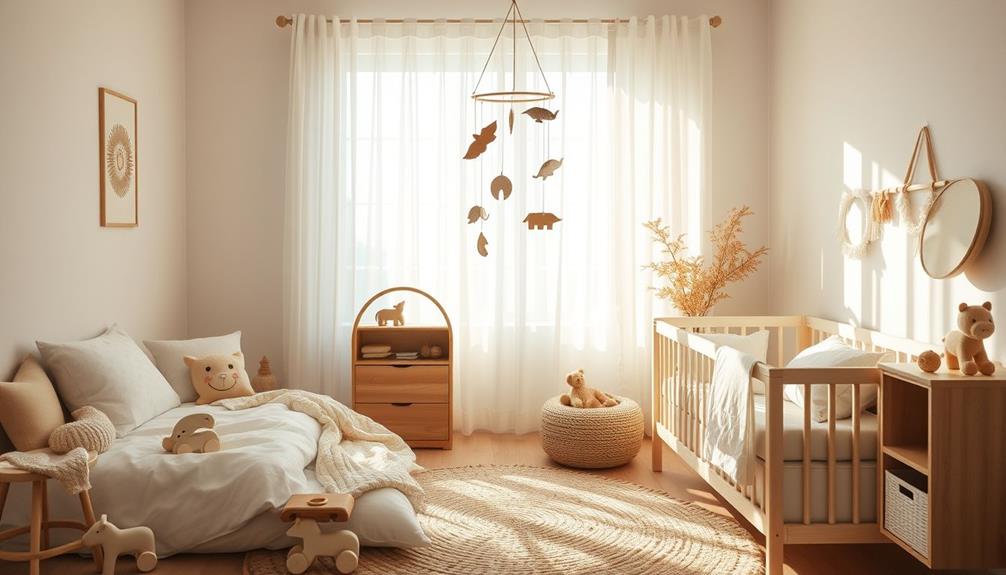
When you choose natural materials for your nursery, you're enhancing your baby's tactile exploration and overall sensory experience.
Incorporating items like wooden toys and organic fabrics can create a soothing environment that promotes learning and growth. These materials not only feel better in little hands but also guarantee a safer environment, free from harmful chemicals.
Plus, their durability means they stand the test of time, making them a practical choice for your growing child.
For instance, consider best travel strollers for airplane travel that use eco-friendly materials, guaranteeing comfort and safety during your family outings.
Tactile Exploration Benefits
Natural materials play an essential role in fostering tactile exploration, offering infants a range of textures that stimulate their senses and support cognitive development. By using materials like wood, wool, and cotton, you provide your Montessori baby with diverse tactile experiences. These experiences help them differentiate various textures, enhancing their fine motor skills and sensory awareness while engaging in hands-on play.
Research has shown that children who interact with natural materials exhibit improved concentration and creativity, promoting a lifelong love for exploration and learning. Incorporating tactile exploration tools, such as fabric swatches and wooden toys, aligns perfectly with the Montessori philosophy of experiential learning.
| Natural Material | Tactile Benefits |
|---|---|
| Wood | Smooth, firm textures |
| Wool | Soft, warm, and varied |
| Cotton | Breathable, gentle on skin |
Using sustainable and eco-friendly natural materials not only supports your child's sensory development but also contributes to a healthier environment, free from harmful chemicals found in synthetic alternatives. By prioritizing tactile exploration, you're setting the stage for your child's growth and discovery.
Safety and Durability
Creating a safe nursery environment is just as important as providing opportunities for tactile exploration. When you choose natural materials like wood and wool, you're not just making an aesthetically pleasing choice; you're also prioritizing your baby's safety. These materials are non-toxic, reducing the risk of harmful chemicals in your baby's space as they explore through touch and taste.
Soft wood in furniture design minimizes splinters and injuries, enhancing safety without compromising durability. This means that your furniture can withstand the rigors of daily use, aligning perfectly with Montessori principles that encourage independence through accessible resources.
Incorporating natural fabrics such as cotton and wool not only enhances comfort but also guarantees breathability, creating a soothing atmosphere that promotes healthy sleep and play.
The durability of these natural materials means they'll last, supporting your nursery's needs as your baby grows.
Safety Considerations for Exploration
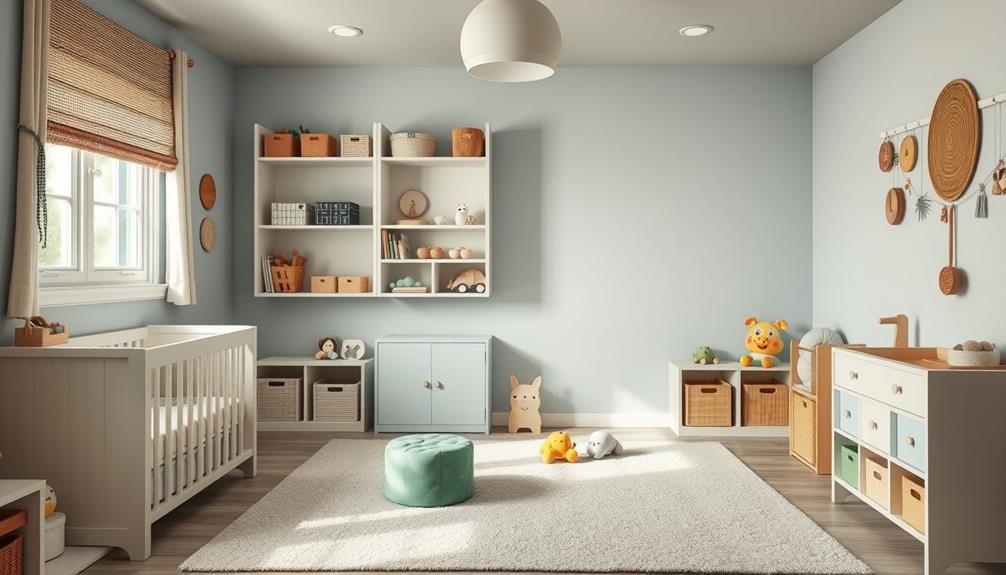
Ensuring a safe exploration environment for your little one is essential as they begin to crawl and discover their surroundings. Baby-proofing your nursery is the first step in promoting safe exploration.
Start by securing heavy furniture to the walls to prevent tipping, and keep hazardous items out of reach. Consider implementing a DIY home security system to enhance safety and provide peace of mind while your baby explores. Choose rounded-edge furniture and soft materials to minimize the risk of injury as they explore.
Install outlet covers and child locks on cabinets to keep electrical hazards and harmful substances inaccessible during their independent exploration. Opt for low, stable furniture that's at your child's level, allowing them the freedom to explore toys and books without the danger of falling from heights.
A clutter-free space is vital as well—maintaining organization facilitates easier movement and reduces the likelihood of accidents.
Child-Sized Furniture Options
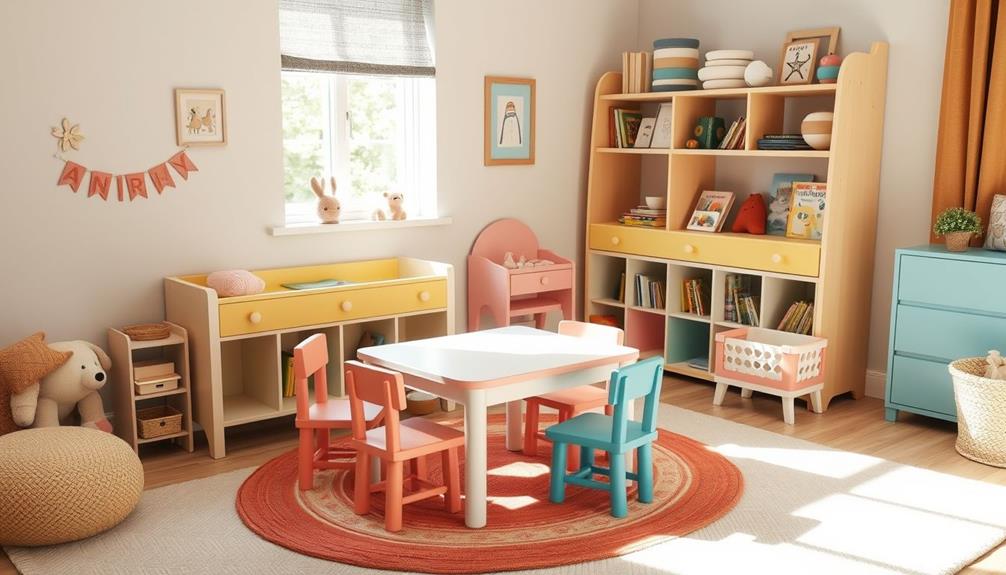
Child-sized furniture is essential for fostering independence and encouraging self-directed play in your nursery. By incorporating low chairs and tables, you enable your baby to engage in activities at their own height, promoting exploration and creativity. This can be particularly beneficial for developing their social skills, as they can invite friends over for playdates or group activities, similar to how proper dog training and socialization encourages interaction among pets.
Consider a floor bed instead of a crib; this choice allows your little one to crawl in and out independently, enhancing their mobility skills and freedom of movement.
Low shelving is another key element. It provides easy access to toys and books, encouraging your child to make decisions about their playtime activities. This accessibility aligns perfectly with Montessori principles, emphasizing self-directed learning.
Don't forget about child-sized stools, which can facilitate self-care activities. These stools help your baby reach the sink for washing hands or assist with dressing, fostering a sense of autonomy and responsibility.
Play and Learning Tools
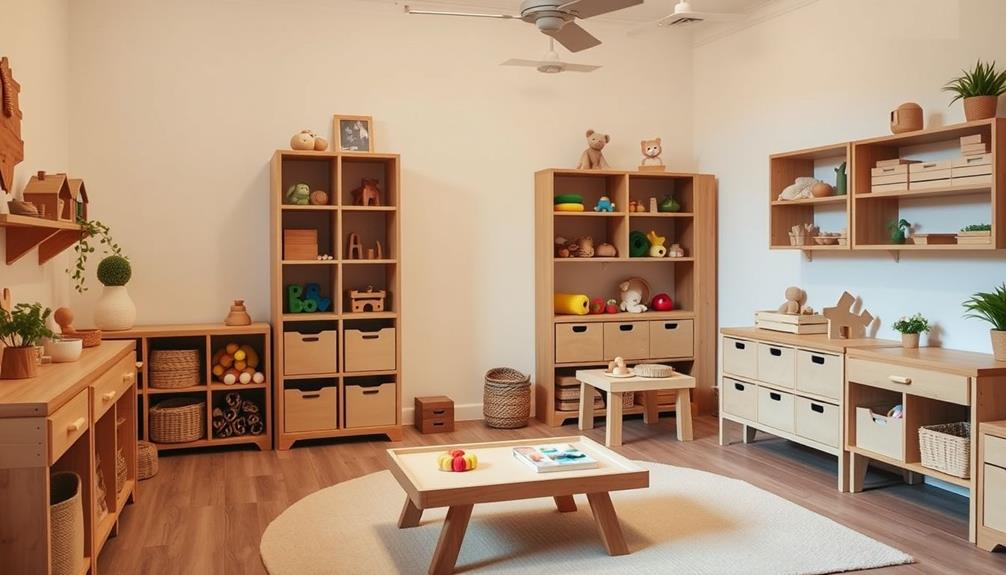
When it comes to play and learning tools, developmental play equipment is essential for encouraging your baby's physical and cognitive growth.
Incorporating sensory exploration activities with various textures, sounds, and weights can make their playtime both fun and educational.
Additionally, including toys that promote imaginative play can enhance creativity and problem-solving skills in your little one.
Developmental Play Equipment
In a Montessori-inspired nursery, developmental play equipment plays an essential role in fostering growth and exploration. Incorporating items like the Pikler triangle allows your advanced baby to climb, promoting physical development and imaginative play in a safe environment.
Developmental toys, such as textured balls and stacking rings, engage their senses while supporting fine motor skills.
Play gyms made from natural materials like wood and cotton offer a tactile-rich experience, encouraging active engagement during tummy time. These gyms not only help develop gross motor skills but also create a nurturing atmosphere for your baby to explore.
Adding low-hanging mirrors enhances tummy time by motivating your little one to reach and move, fostering self-recognition and physical growth.
You can also include floor pillows in your baby rooms to create soft spaces for creative play. These pillows promote freedom of movement, allowing your baby to explore comfortably without obstacles.
Sensory Exploration Activities
Building on the foundation of developmental play equipment, sensory exploration activities enrich your baby's learning experience by stimulating their senses and encouraging discovery. These activities allow your child to look, touch, and engage with the world around them, fostering essential skills.
| Activity | Benefits | Materials |
|---|---|---|
| Textured Balls | Enhances tactile learning and fine motor skills | Various textures |
| Low-Hanging Mirrors | Promotes self-recognition and visual tracking | Unbreakable mirrors |
| Play Gyms | Encourages active play and exploration of textures and colors | Natural materials |
Incorporate developmental toys like rattles and textured balls during tummy time to promote sensory exploration. Additionally, a Pikler triangle encourages climbing and imaginative play, allowing your child to assess risks safely. Use floor pillows to create a comfortable space for tummy time, helping your child develop motor skills and spatial awareness.
Soothing Techniques for Sleep

To help your baby drift off to sleep peacefully, incorporating soothing techniques can make a significant difference. One effective method is the 5 Ss: swaddling, side/stomach position, shushing, swinging, and sucking. These techniques can help your baby feel secure and minimize the startle reflex, leading to better sleep.
Establishing consistent routines, similar to those used in supporting an elderly mother with BPD, is essential for fostering a sense of security for your baby. A predictable schedule fosters a sense of security, making it easier for your baby to relax and fall asleep.
Make sure your sleeping area is conducive to rest—dark, quiet, and comfortable conditions are important for minimizing nighttime awakenings.
As your baby grows, gradually introduce self-soothing techniques. This supports their ability to fall asleep independently, enhancing sleep quality over time.
Remember to prioritize safe sleep practices by always placing your baby on their back to sleep. This is critical in reducing the risk of Sudden Infant Death Syndrome (SIDS).
Creating a Clutter-Free Environment
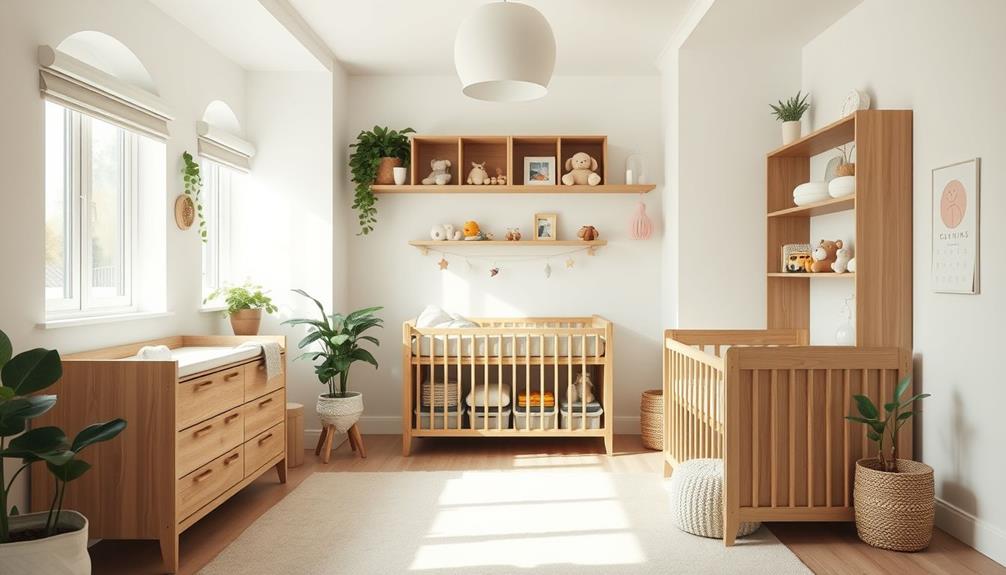
Creating a peaceful sleep environment for your baby sets the stage for their daily exploration and learning. A clutter-free environment promotes focus and independence, allowing your child to engage meaningfully with their surroundings.
As you set up this environment, consider the impact of your child's astrological sign on their personality traits and preferences, as it may influence their engagement with various activities and toys exploration of cosmic connections.
To achieve a clutter-free space, consider implementing low shelving to store a limited selection of age-appropriate toys. This setup makes it easy for your child to access and return items independently, fostering a sense of responsibility.
Utilizing multifunctional furniture is another effective way to minimize excess items and maintain open spaces. This encourages movement and play, essential components of your baby's development.
Regularly rotating toys and materials keeps the environment fresh and engaging, preventing overwhelming choices that can lead to frustration.
Incorporate natural materials and a minimalist design aesthetic to create a calming atmosphere that supports sensory development and curiosity.
As your child begins to explore their surroundings, a clutter-free environment will provide the ideal backdrop for their growing independence.
With these strategies in place, you'll create a nurturing space that encourages exploration while maintaining tranquility in your home.
Building a Supportive Community

Connecting with local Montessori communities can greatly enhance your nursery setup and parenting journey. Engaging with these groups provides valuable resources, workshops, and support networks that can help you navigate child development more effectively.
You'll find that participating in local parenting groups fosters a sense of community where collective problem-solving and encouragement thrive. Additionally, understanding the importance of emotional support in parenting can reinforce the nurturing environment necessary for your child's growth, especially when considering mental health support for both parents and children.
Online forums and social media groups dedicated to Montessori parenting are also excellent platforms for sharing experiences. You can connect with like-minded caregivers, exchange DIY projects, and seek advice that aligns with your values.
By immersing yourself in these environments, you'll gain insights into child development milestones and effective Montessori practices.
Additionally, regularly attending workshops or classes focused on Montessori methods can deepen your understanding and implementation of these principles in your nursery setup. This ongoing education not only boosts your confidence as a parent but also creates lasting connections with others who share your commitment to a Montessori-inspired upbringing.
Ultimately, building a supportive community will enhance both your parenting experience and your baby's development, making your journey more enriching and fulfilling.
Frequently Asked Questions
How to Create a Montessori Nursery?
To create a Montessori nursery, choose child-sized furniture and low shelving that promotes independence.
Use floor beds instead of cribs to support movement and exploration.
Designate soft play areas with natural materials like wooden toys and floor pillows for safe sensory play.
Opt for calming colors and minimalist decor to reduce distractions.
How to Set up a Montessori Infant Classroom?
To set up a Montessori infant classroom, start by arranging low, open shelves filled with age-appropriate toys and books, promoting independence.
Replace cribs with floor beds, giving infants the freedom to move and explore.
Create a soft play area with safe climbing structures, like a Pikler triangle, to enhance physical development.
Use natural materials and calming colors to create a serene space, ensuring all furniture is child-sized and securely anchored for safety.
What Is the Difference Between a Nursery and a Montessori School?
Ever wondered why some kids thrive in Montessori schools while others seem restricted in traditional nurseries? The key difference lies in their approaches.
Montessori schools focus on child-led learning and independence, offering a prepared environment that sparks curiosity. In contrast, nurseries often prioritize basic care and comfort, limiting exploration.
With Montessori, kids engage with thoughtfully chosen materials that align with their developmental milestones, fostering a love for learning from an early age.
What Is a Montessori Bedroom for a Newborn?
A Montessori bedroom for a newborn focuses on independence and exploration.
You'll use a floor bed instead of a crib, allowing your baby to move freely. Incorporate child-sized furniture and low shelves, so they can easily access toys and books.
Safety's key, so baby-proof the space with rounded edges and secure shelving.
Choose calming colors and natural materials to create a soothing atmosphere, and designate areas for sleeping, feeding, and play to encourage engagement.
Conclusion
Setting up a Montessori-inspired nursery can feel overwhelming, but remember, it's all about creating a nurturing environment for your advanced baby. You don't have to spend a fortune on fancy toys or decor—simple, natural materials can spark creativity and exploration. Embrace the journey, and trust your instincts. As you watch your little one thrive in this engaging space, you'll find that the effort is truly rewarding. Together, you're building a foundation for lifelong learning and curiosity.

